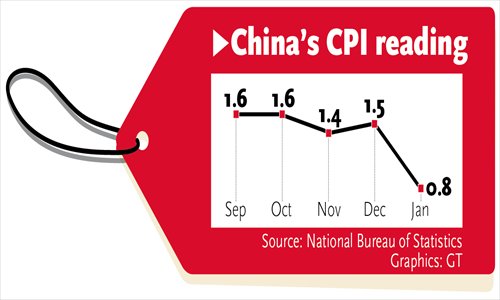

CPI reading could prompt easing measures: analysts
China's consumer inflation in January rose 0.8 percent from a year earlier, the slowest pace in more than five years, official data showed Tuesday, which analysts believe may offer leeway for government measures to spur the slowing economy.
The consumer price index (CPI), the main gauge of inflation, was at its lowest in January since November 2009, according to data released by the National Bureau of Statistics (NBS) on Tuesday.
Food prices, which have a weighting of around one-third of the CPI, rose 1.1 percent in January from a year earlier, down from 2.9 percent in December, the data showed.
Non-food prices, including items such as transport and telecommunications prices, increased by 0.6 percent year-on-year in January, 0.2 percentage points lower than in the previous month, the NBS data showed
The CPI rose by 1.5 percent year-on-year in December, well below the 3.5 percent consumer inflation limit set for 2014.
The low growth in January's consumer inflation was mostly attributed to a high base of comparison, falling international oil prices and unusually warm weather that caused a decline in vegetable prices, Yu Qiumei, a senior NBS statistician, was quoted as saying in a statement posted on the NBS website Tuesday.
"Last year's Spring Festival holidays were in January, which caused a rapid rise in some commodities' prices and created a high base of comparison," Yu said.
According to data from the NBS, the CPI rose 2.5 percent year-on-year in January last year, amid a surge in prices of holiday-related items such as food and travel services.
This year's Spring Festival holidays will run from February 18 to 24.
"The late arrival of Spring Festival this year is a primary factor in the deceleration of consumer inflation, and based on our analytic model the CPI would have risen by 1.4 percent year-on-year in January otherwise," Xu Gao, chief economist with Everbright Securities, wrote in a research note sent to the Global Times on Tuesday.
Inflation is expected to increase in the coming months, rising to around 1-2 percent for the first quarter, Zhang Liqun, a macroeconomics researcher with the Development Research Center of the State Council, told the Global Times on Tuesday.
The lower-than-expected January inflation rate coincided with a continued fall in the producer price index (PPI), a key measure of inflation at the wholesale level.
The PPI fell by 4.3 percent in January from a year earlier, lingering in negative territory for the 35th consecutive month, the NBS data showed.
The slump in the PPI is largely due to sluggish domestic demand and overcapacity in industries such as steel, Liu Xuezhi, an analyst at Bank of Communications in Shanghai, told the Global Times on Tuesday.
"The weak inflation profile suggests that deflation has become a real risk for China, which could pave the way for more monetary policy easing following the central bank's cut of the reserve requirement ratio (RRR) recently," Australia and New Zealand Banking Group wrote in a research note sent to the Global Times on Tuesday.
The People's Bank of China (PBC), the central bank, announced on February 4 a reduction in banks' RRR by 50 basis points (bps), the first cut in more than two years.
The cut means that large commercial banks only need to hold 19.5 percent of their deposits as reserves, allowing more funds to be used for loans.
In the context of slower GDP growth, a downturn in inflation should prompt the PBC to ease monetary policy further, economists from UK-based investment bank Barclays Capital said in a report on Tuesday.
"We expect two more 50 bps cuts in the RRR and two interest rate cuts of 25 bps each this year," it said.
In a statement on its website late on Tuesday, the PBC said China will continue to implement a prudent monetary policy, and fine-tuning and modest adjustments will be made at the appropriate time to support sustainable growth in the economy.
The low inflation gives policymakers more leeway for measures to spur the slowing economy, and with a further easing of monetary policy the economy is expected to expand by 7.2 percent in 2015, Liu said.
Lower Jan CPI rise affords monetary easing more room: experts
2015-02-10China January CPI cools to 0.8 pct
2015-02-10China‘s CPI up 1.5 pct in December
2015-01-09Copyright ©1999-2018
Chinanews.com. All rights reserved.
Reproduction in whole or in part without permission is prohibited.